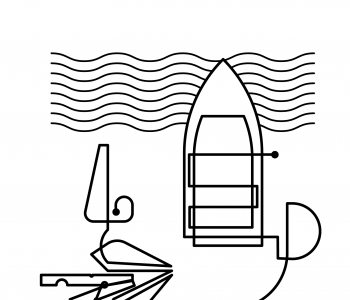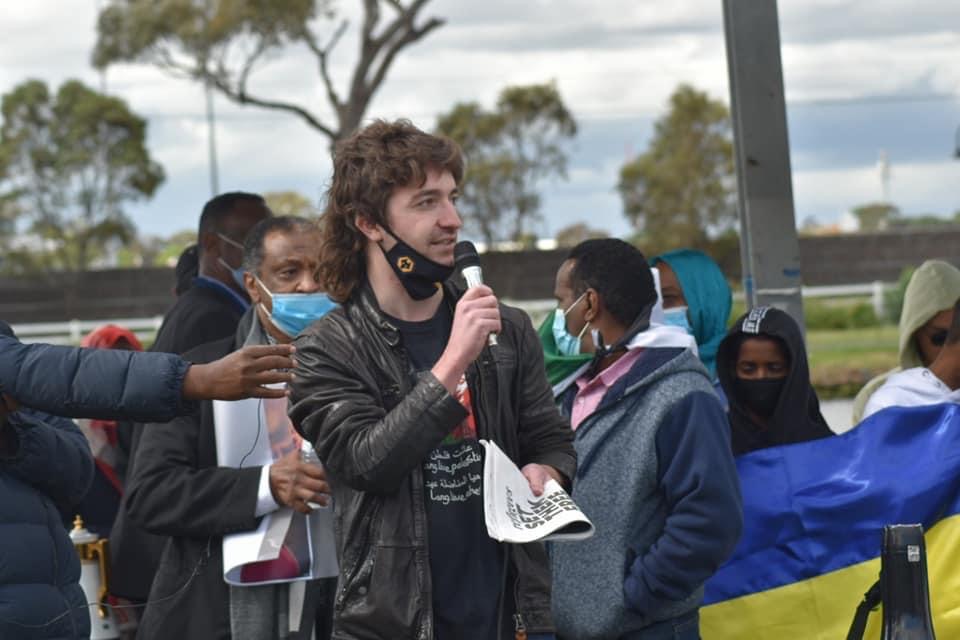في مجلتنا الجديدة نشاركك مقالات وأفكار تبحث عن الجمال والحرية، وتفتح مساحات لاكتشاف سرديات جديدة بعيدًا عن القوالب الجاهزة.

في مجلتنا الجديدة نشاركك مقالات وأفكار تبحث عن الجمال والحرية، وتفتح مساحات لاكتشاف سرديات جديدة بعيدًا عن القوالب الجاهزة.

A chat with my Australian colleagues on their support for Palestine
French philosopher Jean Baudrillard, in his work “The Gulf War Did Not Take Place,” published in the advent of the Gulf War in 1991, once said, “Who, apart from the Arab masses, is still capable of believing in the war and becoming inflamed by it?”
In the age of telecommunications, where wars are aired live on TV, as was the case with the Gulf War aired on CNN in 1990-1991, people can witness the horrific acts committed in wars as if watching a simulation or an action movie, with no implications in the real world. Similarly, western audiences watching the war on Gaza streamed live on the internet wouldn’t experience direct effects or feel as much sorrow as the Arabs, who are stuck in a region of continuous war and conflict.
It wasn’t until I spoke to some of my Australian friends about their support for Palestine that I came to understand why people other than the Arabs can be inflamed by the war on Gaza. I remember one of them saying that he would spend his whole life defending a just cause like that of the Palestinians than die in vain, submerged in leisure and surplus enjoyment of life. I looked at him and said, ‘Yes, me too’, and then resumed to say that this is the only way we can reconcile with ourselves before we die and then just die in peace. We looked at each other for a moment and our eyes were filled with tears. It is precisely at that moment that I realised there is a core to our eagerness to see justice prevail regardless of religion, ethnicity, gender, or class.

Matt came to learn about Palestine at
around the age of 17.
I have to say that those who speak up for their pro-Palestine sentiment in the West are very courageous people. In Australia, where I live now, it is fairly normal to denounce God in public, criticize the government, or contest your professor’s opinion in front of a mass audience. However, when it comes to expressing a pro-Palestine opinion in public, you’ll find people afraid to speak. I remember sitting in a café discussing what was going on in Palestine with a friend when she started coming closer and closer nearly whispering in my ears her pro-Palestine sentiments instead of communicating them to me proudly and loudly. People fear that their pro-Palestine sentiment will lead them to lose their jobs, get accused of antisemitism, or be deported from the country in case of being an immigrant.
To understand why Australians bother to speak up in favour of such a distant country like Palestine despite the possibility of harm associated with such support, I spoke to Alice, a 26-year-old university student who is doing an honours degree in literary studies in Melbourne, and Matt, a 25-year-old socialist activist based in Melbourne.
Alice is keen on attending the pro-Palestine rallies each week besides posting extensively on social media about what’s going on in Gaza. In the process of revealing her pro-Palestine sentiment, she got blocked by one of her friends who objected to her views. Alice believes that defending Palestine is part of a struggle against colonialism. In her own words, ‘it is one of the biggest anti-colonial struggles of our time’.
Although the Arab-Israeli conflict wasn’t part of Alice’s school curriculum in Australia, she learned about Palestine at the age of 17 through her mother, who had pro-Palestine opinions. That said, Alice wasn’t very aware of the issue of Palestine except when she came across the Palestinian film ‘Farha’, which was screening in Melbourne in 2022. Coming to know the horrors of the 1948 Nakba that the film discusses, Alice decided to educate herself about the history of the conflict by fetching the internet, reading books, following Palestinian journalists and educators on social media, and talking to her Arab friends.
Inflamed by the immense killing of the Palestinian civilians as Israel retaliated Hamas’s attack which took place on October 7th 2023, Alice decided to boycott Israeli brands, join the protests calling for cease fire, and send her representative an email asking her to take a more favourable stance towards Palestine in an effort to cease-fire in Gaza. The representative’s response was disappointing to Alice. As Alice tells me, after addressing the complexity of the issue (without referring to the words ‘Palestinian’ or ‘Palestine’ as if they are non-existent) and denouncing the killing of civilians in general, the representative shoved the blame off Israel’s shoulders and reassured Israel’s right to defend itself.
Alice does not really feel afraid to express her pro-Palestine sentiment by wearing her pro-Palestine badge or holding a sign on public transport, but fears for her international friends. It is becoming increasingly fearful to wear a Keffiyeh, especially after the shooting of three Palestinians in the US. The shooting appears to be a hate crime, according to the American-Arab Anti-Discrimination Committee statement that said, “We have reason to believe this shooting occurred because the victims are Arab”. For Matt, the keffiyeh is something he loves to wear and mingle around in the city. Matt informs me that one time while he was crossing the street wearing his Keffiyeh, a young white girl stopped him, pointed at his keffiyeh, and said, ‘Thank you’ with a thumbs up.
Newly involved in socialist politics as a student back in 2016, Matt came to learn about Palestine at around the age of 17. Previously, Matt had heard of the invasion of Iraq and Afghanistan. However, he explained to me that, unlike Iraq and Afghanistan, ‘Palestine has not really been an issue in Australia that the people think about or identify with’. Matt describes his revolutionary socialist activism as the reason behind his awareness of the Palestinian cause as part of a struggle against imperialism and capitalism. Through his socialist background, he learnt to stand with the oppressed and show solidarity with the people that he says, ‘his government is responsible for oppressing’. Matt refuses Australia’s support to Israel and feels that rallies are pressuring the government to reconsider its support for Israel.
Besides going to the rallies and organizing protests, Matt boycotts Israeli goods and affiliated businesses. It is not only the fight against imperialism and dehumanization of the Palestinians that pushes Matt to support Palestine but also his belief that capitalism is the source of many of the oppressions and exploitations of the Palestinians and others around the world. By describing to me how the Australian dock workers refused to load pig iron bound for military production in Japan in 1938 as they knew about the horrors Japan was committing against the Chinese people, Matt sought to explain that the struggle should stem not only from the Arab world but also from within the Western capitalist world where the production of sophisticated weapons and weapon research takes place.
Both Alice and Matt care about Palestine because they feel that for so many years their government has tolerated what Israel is and has been doing to the Palestinians and regard it as unjust. According to Israeli-British historian Ilan Pappé in his book The Forgotten Palestinians: A History of the Palestinians in Israel (2011), it is not Palestinians living under Israeli-imposed siege on Gaza who suffer but also those Palestinians living inside Israel (1948 borders) as second-class citizens, who are being continuously discriminated against.
As Matt noticed, as much as I did as well, there has been an increase in the number of Australians supporting Palestine. From Matt’s experience as an Australian and an activist who has been involved in many other protests and campaigns in Australia, those rallies are ‘quite unprecedented in his lifetime’. According to Matt, this is also one of the very rare times to see school students protest and organize strikes. To him, such interest in supporting Palestine shows that fighting for a better world is possible, although he is not quite optimistic that it will change Australia’s relationship with Israel, short of a revolution.